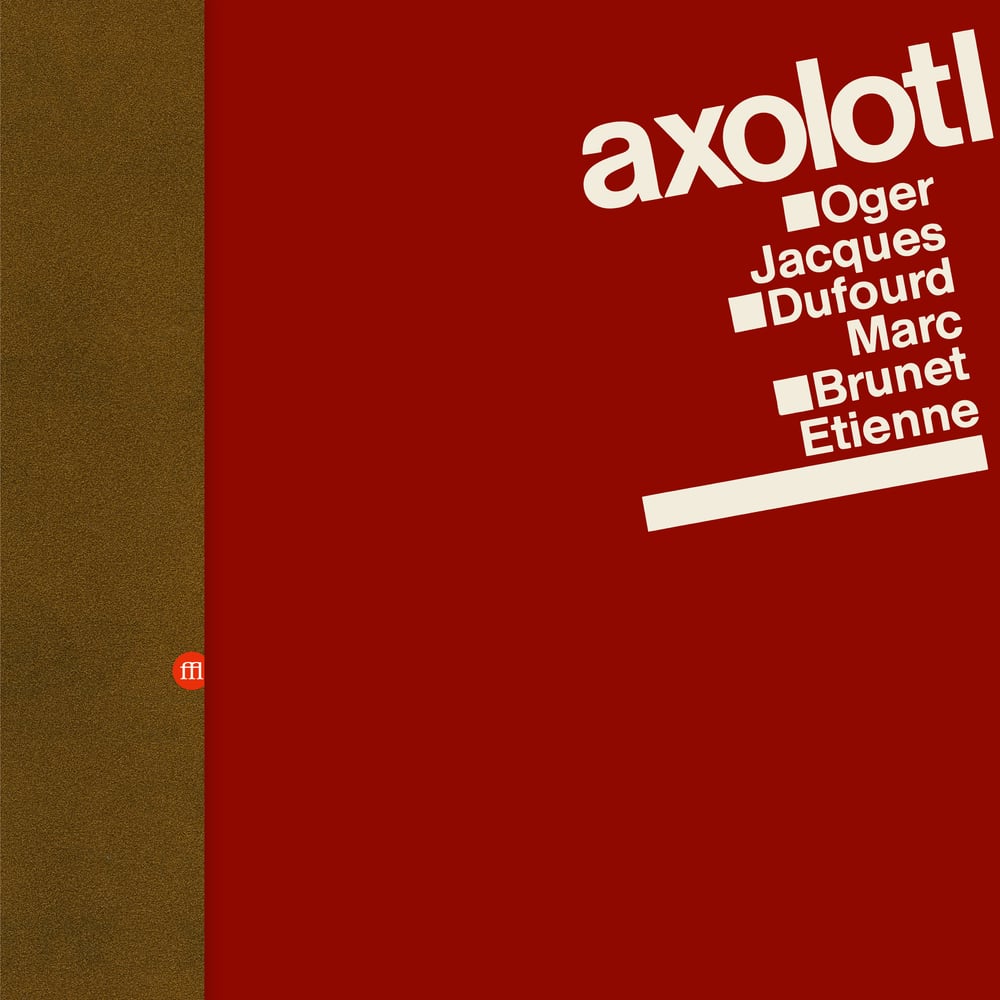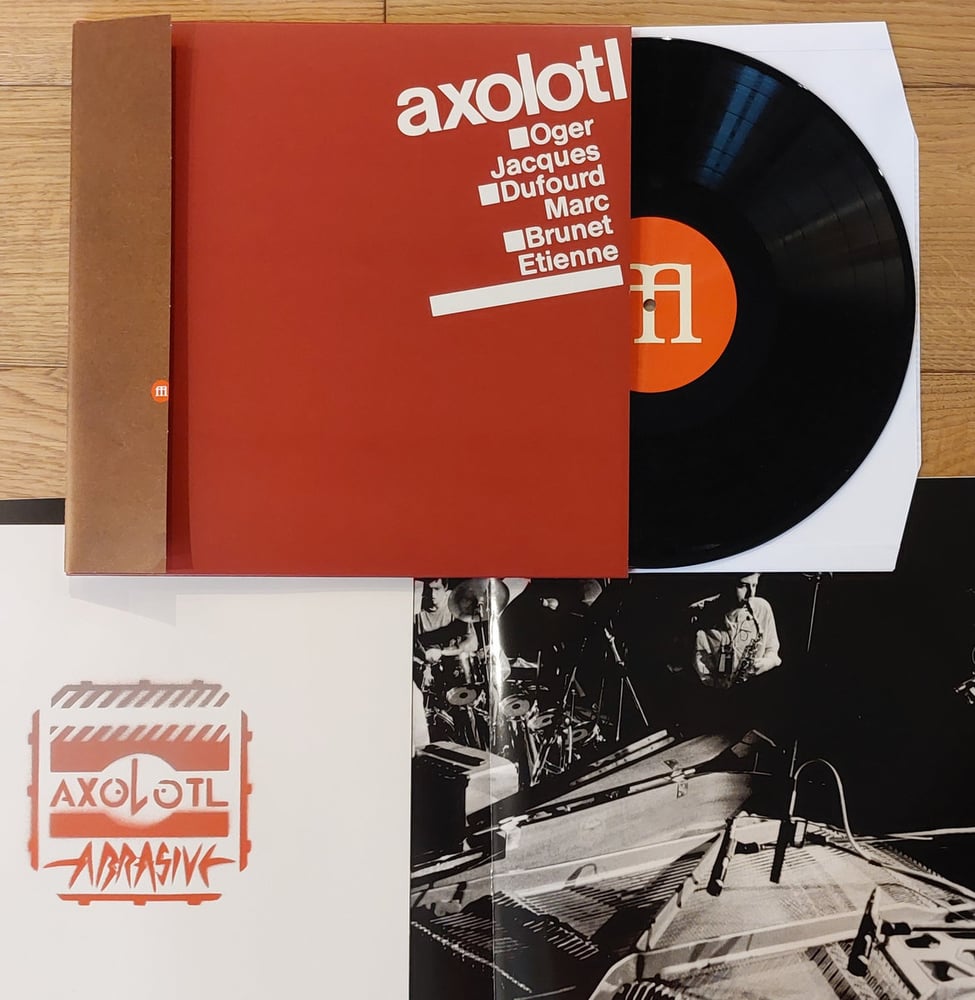Axolotl - Abrasive (FFL082)
25,00 €
Carefully remastered from the master tapes by Gilles Laujol
Graphic design by Stefan Thanneur
8 page booklet - Heavyweight 180 gr. LP
425 gsm brownboard outer sleeve
Licensed from Etienne Brunet
In 1981, encouraged by Jac Berrocal, Axolotl (Etienne Brunet and Jacques Oger on saxophones and clarinet, Marc Dufourd on electric guitar) recorded an album of French-style free music as iconoclastic as it was unsettling: free improvisation, jazz, no wave, contemporary, punk… a dance of labels which leaves plenty of place for the direct expression of a monstrous trio of regenerated agitators!
The axolotl is a species of salamander native to Mexico, living in a state of larva and having the capacity to regenerate damaged organs. This brief introduction doesn’t tell us if the axolotl sings. But, for the one that concerns us here: yes indeed.
In Paris, at the end of the 1970s, Etienne Brunet and Marc Dufourd would improvise regularly, inspired by some other saxophone-guitar duos: Claude Bernard-Raymond Boni firstly, then Evan Parker-Derek Bailey. When Jacques Oger (a saxophonist whom Brunet had met at a workshop given by Steve Lacy at the Châteauvallon festival in 1977) joined the duo Brunet-Dufourd, Axolotl was born.
Iconoclastic, the trio was bound to please Jac Berrocal, and he proposed to record their first album on the label ‘D’avantage’. In spring 1981 three days were just enough for Oger (tenor and barytone saxophones), Brunet (alto saxophone, bass clarinet and ‘things’) and Dufourd (electric guitar) to complete Axolotl, the first album by a group which would record … two.
If there was a collective of iconoclasts, the trio would be there with some relatives: Alterations, Fred Frith, John Zorn, the ROVA Saxophone Quartet… and then because we mention a collective, Axolotl steps (considerably) beyond the domain of free improvisation to lean towards jazz (“Illusion”, “Paris, froissé”), No Wave (“Ombre pilée”, “Trottoirs défunts”), contemporary (“Oreiller”, “D’autres seuls”), and even what we could call … acid fun (“Dehors”).
Above all, Axolotl wanted to really get to grips with sound via an expression as direct as it was liberating, as can be heard on “Ozone, flocon, torsion”, producing a noise that, even today pierces the brain. All we can hope is that now, thanks to this wonderful reissue, listeners will be able, like the axolotl, of regeneration.
*
En 1981, sur les encouragements de Jac Berrocal, Axolotl (Etienne Brunet et Jacques Oger aux saxophones et clarinette, Marc Dufourd à la guitare électrique) enregistre un album de free music à la française aussi iconoclaste que déroutant : improvisation libre, jazz, no wave, contemporain, punk… Les étiquettes valsent pour laisser toute la place à l’expression franche d’un monstrueux trio d’agités du bocal !
L’axolotl est cette espèce de salamandre originaire du Mexique qui passe sa vie à l’état de larve et a le pouvoir de régénérer ses organes endommagés. Cette courte introduction ne nous dit pas si l’axolotl chante. Or, celui qui nous intéresse : caramba, sí.
A la fin des années 1970, à Paris, Etienne Brunet et Marc Dufourd improvisent régulièrement sous l’influence d’autres duos saxophone-guitare : Claude Bernard-Raymond Boni d’abord, puis Evan Parker-Derek Bailey. Quand Jacques Oger (saxophoniste que Brunet a rencontré lors d’un workshop donné par Steve Lacy au festival de Châteauvallon en 1977) rejoint le duo Brunet-Dufourd, c’est la naissance d’Axolotl.
Iconoclaste, le trio était fait pour plaire à Jac Berrocal, qui leur propose d’enregistrer leur premier disque pour le label D’avantage. Au printemps 1981, trois jours suffisent à Oger (saxophones ténor et baryton), Brunet (saxophone alto, clarinette basse et « choses ») et Dufourd (guitare électrique) pour mettre en boîte Axolotl, premier album d’un groupe dont la discographie en comptera… deux.
Si iconoclasme il y a, le trio se reconnaît quand même quelques cousins : Alterations, Fred Frith, John Zorn, le ROVA Saxophone Quartet… Et puisqu’il y a iconoclasme, Axolotl déborde forcément (et largement) du champ de l’improvisation libre pour aller voir du côté du jazz (« Illusion », « Paris, froissé »), de la No Wave (« Ombre pilée », « Trottoirs défunts »), de la musique contemporaine (« Oreiller », « D’autres seuls »), et même de ce que nous appellerons… l’acid amusette (« Dehors »).
Surtout, il y a chez Axolotl cette envie d’en découdre au son d’une expression aussi franche qu’affranchie qui lui permet, comme sur « Ozone, flocon, torsion », de mettre la main sur des bruits qui, encore aujourd’hui, vous transpercent le cortex. Reste maintenant à espérer qu’après l’écoute de cette belle réédition, l’auditeur se montrera, comme l’axolotl, capable de régénération.
33rpm.
©2023 SouffleContinu Records
-
If you want registered shipping,
please contact us at:
[email protected]
We can’t guarantee delivery or refund without registered shipping. Sorry about that.



